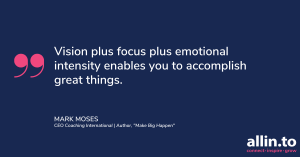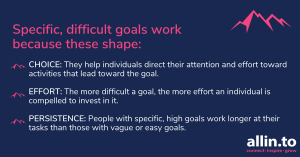
Setting difficult, specific goals primes an entrepreneur to learn from all stages of the process, from generating ideas and gathering resources, to building organizations, reinventing products, and finding new markets. Why do difficult goals work so well?
The more difficult your goal, the better you’ll perform.
When entrepreneur and author Mark Moses was going through a tough stretch in his business, he and his good friend Jack Daly chose not to map out a conservative plan of action that would help the business survive.
Instead, they set what they called “a Huge Outrageous Target, a goal so big and so outrageous that it sparked a fire in our team and gave them a way forward to new growth.”
In his 2017 book “Make Big Happen,” the founder of CEO Coaching International explained that focusing on an outrageous target helped him resist the temptation to do more—to chase a longer list of smaller goals—and to focus instead on chasing the goal that mattered most.
Other authors have come up with other names for a similar concept. Jim Collins has his Big, Hairy Audacious Goal (BHAG), whilst Chris McChesney, Jim Huling, and Sean Covey all swear by Wildly Important Goals (WIGs) in The 4 Disciplines of Execution.
Through CEO Coaching International, Mark has helped hundreds of business leaders worldwide to lead effectively and pay attention to the opportunities for growth that emerge even in the most difficult situations.
“As the CEO, don’t get lost in the weeds,” he has said. “Focus on the five important things you should spend your time on: vision, cash, people, key relationships, and continuous learning.”
He also emphasizes the importance of asking better questions and of having an ambitious vision.
In his first business, he took a Student Painters franchise from 0 to 250 branches that employed more than 3,000 students in his first 4 years.
“Looking back, my initial vision was simply to make enough money to pay for college. Over time, the vision grew as I realized the vastness of the world’s opportunities,” Mark wrote. “Through it all, a clear vision of what I was trying to accomplish was the key.”

There’s plenty of evidence that supports the wisdom of setting ambitious—even outrageous—goals.
For 25 years, management and organizational behaviour professors Edwin Locke (University of Maryland) and Gary Latham (University of Toronto) examined about 400 studies on goal-setting and performance. All told, those studies involved nearly 40,000 participants in 8 countries, performing more than 80 tasks.
When Latham and Locke published their Goal-Setting Theory in 1990, among their core findings were:
- that there is a linear relationship between the degree of goal difficulty and performance: participants with the highest goals performed up to 250 percent better than those with the easiest goals; and
- “Specific, difficult goals lead to higher performance than no goals, as well as vague, abstract goals such as ‘Do your best.’”
These findings have held true across different domains, including education, leadership, psychotherapy, health promotion, creativity, bargaining, sports, and entrepreneurship.

By the time Latham and Locke updated their goal-setting theory in 2013, hundreds of other studies had led to other insights about why some goals (usually specific, difficult ones) inspired better performance.
Among these insights were:
- Whether goals are self-set or assigned by others, difficult goals are more likely to be reached by those who are more committed to these goals than others. Commitment includes attachment to a goal and the determination to reach it.
- Withholding performance feedback leads to ineffectiveness. People need feedback to figure out if more effort or a different approach is needed to reach a difficult goal.
- Self-efficacy matters. The more teams believe that they can perform a task well—that they are mentally and physically able to deliver it—the more committed they are to the goal, even if it means having to overcome obstacles along the way. Performance is shaped not just by the goal itself (what one is trying to do) but also by self-efficacy (how confident one is of being able to do it).
As long as the essentials are in place (information, raw materials, and personal characteristics like choice and persistence), “difficult goals inspire higher performance than easy goals do.”
**********
Learn more about setting huge, outrageous targets from Mark Moses, founding partner of CEO Coaching International, coach of TaskUs, and author of “Make Big Happen.” (Oh, he’s also a 12-time finisher of the full-distance Ironman.)
Join Mark in our Go All In for Growth virtual conference at 7 p.m. (EST) Thursday, 11 June (that’s 9 a.m. AEST on Friday, 12 June for our friends in Australia).
Claim your free spot here: http://allin.to/
About GoTeam (formerly Go Virtual Assistants)
GoTeam, formerly GO Virtual Assistants (GO-VA) Inc. is a registered Australian-Filipino owned company growing in the heart of Cebu City, as well as a growing number of key cities in the Philippines.
Our HQ is situated in an IT complex with modern facilities, although since March 2020, more than 70% of our team members have been working from home.
Our enhanced operations and streamlined services provide scalable opportunities that spell sustainability, growth, and success for any business venture. As your global team members, GoTeam’s goal is to create winnable games and strategies across all the work that we do, knowing that your success is our long-term fulfillment.
We help Australian, NZ, US, and UK businesses increase revenue, reduce costs, and scale through outsourced offshoring. This also creates for us the opportunity to be a catalyst for people to exceed.
AU (+61) 2 7227 8809
US (+1) 302 207 2767
PH (+63) 32 238 7448
9th Flr, i1 Bldg, Jose Ma. del Mar St, IT Park,
Cebu City, Philippines 6000
Website: https://go.team
Careers: https://go.team/ph
Email: sales@go.team
Email: careers@go.team






